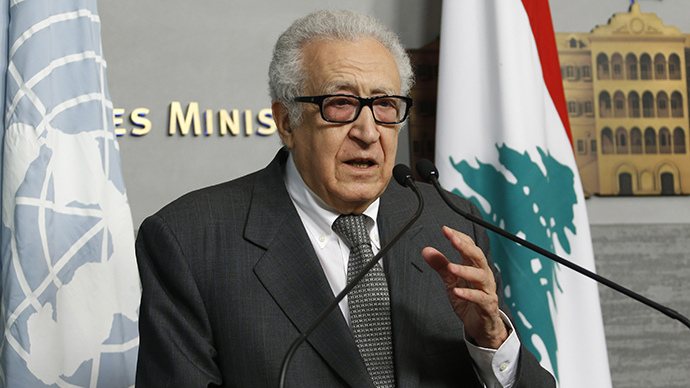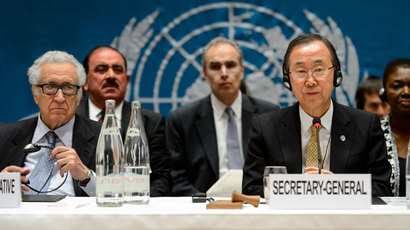Syrian govt, opposition delegations agree to meet 'in the same room' Saturday

Syria's government and opposition delegations have agreed to hold direct talks on Saturday, UN-Arab League Joint Special Representative to Syria Lakhdar Brahimi said, adding that the two sides recognize the principles of the Geneva 1 communique.
"Tomorrow we have agreed that we shall meet in same room," Brahimi told a news conference after he held separate meetings with government and opposition delegations in Geneva. "Both parties will be here tomorrow...they will not leave on Saturday or Sunday," he said, adding that the discussions were "encouraging."
The envoy acknowledged, however, that core matters are yet to be discussed and that the resolution of the conflict will not be without its challenges. "I hope that they will go smoothly...we do expect some bumps on the road," he said."It's impossible that there aren't any in a situation like this."
Brahimi said he would steer Saturday’s meeting towards the humanitarian situation in Syria and accessing blocked areas.
The talks will be based on the Geneva Communique, he also said, that is on the June 2012 statement by world powers which called for the two sides to agree on the establishment of a transitional body. Brahimi stated that it is clear to both sides that the "meat" of the conference would be how do implement the dispositions of the pact.
"I think the two sides understand that very well and accept it," Brahimi said, while noting that "there are different interpretations on some of those items".
Still, the first session is expected to be mainly focused on "practical issues which will make discussions a little easier."
Although the overwhelming aim is the cessation of all violence, Brahimi underlined that there are those who do not share the same target.
"We are aware that there are parties inside Syria that do not support such a track," he said. "Nobody wants for terrorism to continue except terrorists themselves. Therefore if we manage to save Syria - saving Syria will be also saving it from terrorism."
Brahimi went on to express certain doubt over the tense talks. "I'm worried all the time," he said. "But I hope that it will be a good beginning."
Part of the confidence building measures will include a discussion over the next two days to provide humanitarian aid to the city of Homs, a hotspot of the armed Syrian crisis where rebels continue to battle government forces in the central districts.
"The practical aspects have been worked on, things are ready and if the government doesn't put a block on it then it could happen quickly," one source told Reuters.
Anas Absah, an opposition delegate, hailed the news that the government embraces Geneva principles.
"We are satisfied with Mr. Brahimi's statement today and that the regime has accepted Geneva 1 (communique). And on this basis we will meet the Assad delegation tomorrow morning. It will be a short session in which only Brahimi will speak, to be followed by another session, a longer session in the afternoon," Absah told Reuters.
Friday already saw some of its own challenges with Syrian Foreign
Minister, Walid Muallem, threatening to walk out of peace talks
shortly after they began. Muallem told Brahimi that he would
leave the talks if “serious” discussions had not begun by
Saturday.
Friday was initially supposed to have been the first day of the
talks. However, neither side had been prepared to meet the other,
Brahimi convened with government officials in the morning and the
opposition in the afternoon before holding the bustling press
conference.
UN spokeswoman Alessandra Velluci told a briefing in Geneva earlier in the day: “This process is being shaped at the moment. It has to take time for the preparations. There are no Syrian-Syrian talks at the moment.”














